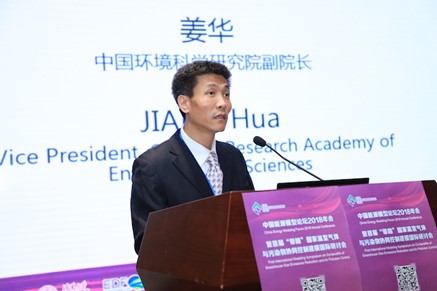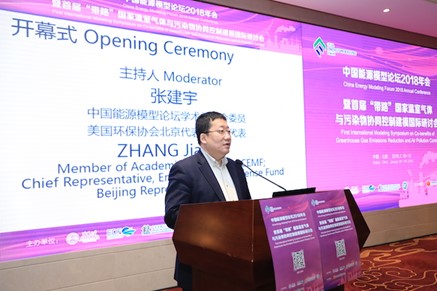On January 18-19, 2019, the 2018 Annual Conference of the China Energy Modeling Forum and the first "Belt and Road" National Greenhouse Gas and Pollutant Coordinated Control Modeling International Symposium was held in Beijing. Experts and scholars from the United States, the European Union, France, Japan, South Korea, India, Mongolia, Egypt, Benin and other countries and regions and Chinese scholars researched and formulated the "2050 Low Emission Development Strategy" and realized the coordinated control of pollution control and greenhouse gases The methods and data were discussed in depth.

Jiang Zhaoli, deputy director of the Climate Change Department of the Ministry of Ecology and Environment, attended the meeting and delivered an opening speech. Jiang Zhaoli said that the Chinese government attaches great importance to the control of pollutants and greenhouse gases, and strives to promote coordinated control. Institutional reform in 2018 transferred the Department of Climate Change from the National Development and Reform Commission to the Ministry of Ecology and Environment, providing favorable conditions for further strengthening the control of pollutants, actively responding to climate change, and more effectively realizing the coordinated governance of the two. This meeting is of great significance for promoting quantitative analysis of the benefits of pollutant control and greenhouse gas control, and exploring ways to achieve maximum emission reduction with the lowest economic cost.

Jiang Hua, vice president of the Chinese Academy of Environmental Sciences, said that the "Three-Year Action Plan for Winning the Blue Sky Defense War" clearly proposes to coordinate the reduction of greenhouse gas emissions. Coordinated control is the combination of global environmental issues and domestic environmental issues. Exchange and share the measures and experiences of countries along the “Belt and Road” in air pollution control, greenhouse gas emission reduction, and synergistic effects. Collaborative research on platoons has important strategic significance.

Professor Zhang Xiliang, chairman of the Energy System Engineering Professional Committee of the China Energy Research Society, said that model research and communication are of great significance. This seminar can promote international exchanges between model teams, provide support for the construction of the "Belt and Road" from a scientific point of view, and bring The signal of China's construction of a green "Belt and Road" is better transmitted.

Zhang Jianyu, chief representative of the Beijing Representative Office of the Environmental Defense Funds of the United States, said that the economic, energy and environmental ties between countries along the “Belt and Road” and China will become closer and closer as the “Belt and Road” initiative continues to advance. Both China and the “Belt and Road” countries need to consider the interrelationships when formulating the 2050 low-emission development strategy. This conference is a practical action for the government and research institutions to promote the joint construction of a "community with a shared future for mankind" and a green "Belt and Road".
The participating experts and scholars exchanged and shared the medium and long-term low-emission development strategic vision, the latest progress in collaborative control model methodology, and the countries along the "Belt and Road" in air pollution control, greenhouse gas emission reduction and synergistic effects from different perspectives and levels. Practice and experience, exchange on obstacles faced in the process of collaborative control, policy needs and technical needs.
International Symposium on Coordinated Control Modeling of Greenhouse Gases and Pollutants in “Belt and Road” Countries is a new attempt of China Energy Modeling Forum to expand international exchanges, aiming to build exchanges of data and model tools for climate change and air pollution control in countries along the “Belt and Road” The platform establishes a long-term cooperation mechanism to provide policy and technical support for China and countries along the "Belt and Road" to formulate medium and long-term development strategies on pollution control and greenhouse gas emission reduction, and also to provide support for the "community of shared future for mankind" and the "Belt and Road Initiative". "Contribution to construction. The 2018 Annual Meeting of the China Energy Modeling Forum is co-hosted by the School of Public Administration of Tsinghua University, the American Environmental Protection Agency, the Industrial Development and Environmental Governance Research Center of Tsinghua University, and the Chinese Academy of Environmental Sciences, and co-organized by the Energy System Engineering Committee of the China Energy Research Society.
China's 2050 low-emission development strategy research is the second theme research of China Energy Modeling Forum (CEMF02). Previously, the China Energy Modeling Forum conducted research on the peaking of China's greenhouse gases, and the research results were published in "Climate Change Research Progress" (in English).
Appendix:
![]() Zhu Songli: Coordinated Development of Regional Low-Carbon Economy and Land and Space Development Pattern.pdf
Zhu Songli: Coordinated Development of Regional Low-Carbon Economy and Land and Space Development Pattern.pdf

